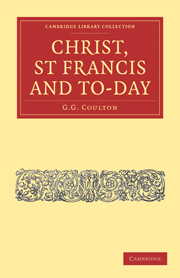Summary
THE fourth objection has still to be met, not simply by pointing out that it is utterly inconsistent with the third, but separately, on its own merits. We are often told that modernism in Christianity is a ‘soft option,’ ‘a line of least resistance,’ which men choose as a refuge from the austere gospel of traditionalism. Modernists (to use a word which is at least brief and convenient) are daily accused of cheapening the gospel. Men tell us: ‘You will never win the world by lowering the standard of religion; hold up before men's eyes a real sacrifice, and they may come with you, offer them the mockery of a sacrifice, and they will mock at it and you.’ The words are very true; but the implication is very false. Nobody ever cheapened the gospel more shamelessly than the traditionalist friar of later generations, of whom both orthodox and unorthodox contemporaries report that he would help you through any sin in the decalogue if you would help him to yiolate his vow of poverty. On the other hand, no modernist writings I happen to have read would seem to justify even a momentary suspicion that the modernist hopes to get the kingdom of heaven on cheaper terms than other people. I speak again, of course, only of the sincere enquirer; for it must sadly be admitted that insincerity can shroud itself under the cloak of modernism almost as easily as under that of traditionalism.
- Type
- Chapter
- Information
- Christ, St Francis and To-day , pp. 114 - 133Publisher: Cambridge University PressPrint publication year: 2010First published in: 1919

